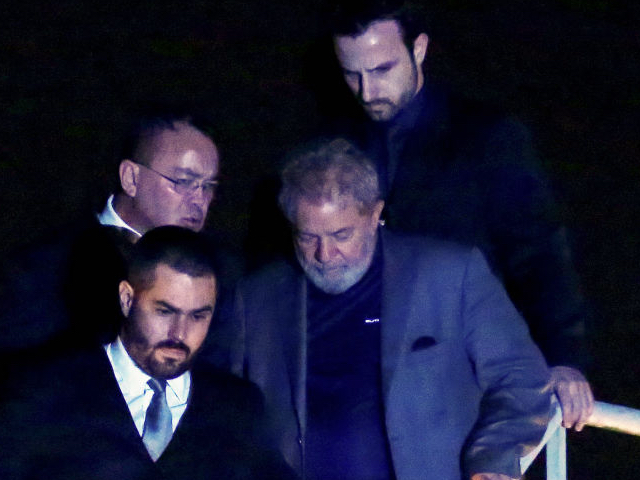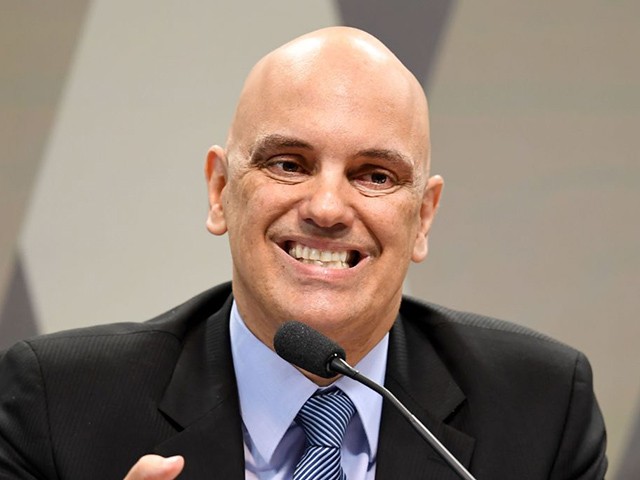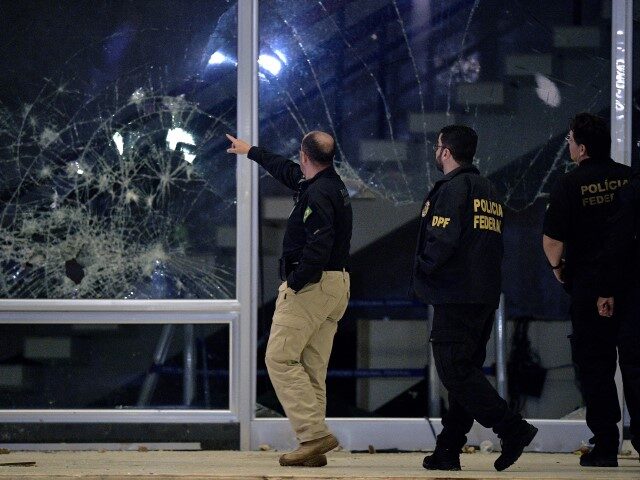The head of Brazil’s Supreme Federal Tribunal (STF), Alexandre de Moraes, ordered the removal of Ibaneis Rocha from his position as governor of the nation’s Federal District (Brasília) for 90 days on Sunday evening.
De Moraes acted following a request from the government of far-left President Luiz Inácio Lula da Silva in response to Rocha’s alleged “willful omission” of action in his response to a riot that vandalized the headquarters of the Brazilian Congress and STF on Sunday.
Thousands of anti-Lula protesters stormed the heart of Brasília on Sunday, destroying the glass facades of the two headquarters and targeting priceless works of art, the chambers where lawmakers and judges do their business, and other areas. Police have arrested hundreds of people as of Monday afternoon in relation to the riot.
Ibaneis Rocha, whose candidacy counted with the backing of former President Jair Bolsonaro, had been reelected governor of Brazil’s Federal District during the October 2022 general elections.
The STF clarified in a statement that the removal of Rocha was a response to requests from “the Attorney General’s Office, Senator Randolfe Rodrigues, and the general director of the Federal Police (PF), Andrei Rodrigues.” Rocha temporarily lost his democratically elected position “in view of the practice of terrorist acts against democracy and the Brazilian institutions that took place in the capital this Sunday, when vandals invaded and damaged the buildings of the STF, the National Congress and the Planalto Palace.”
The riot in Brasília was a response to Lula, a convicted felon when the STF overturned his conviction on procedural grounds, beginning his third presidential term on January 1. The protesters set parts of the nation’s Congress on fire, trashed several offices, and caused “irreparable” damage to the artifacts housed within the chambers of the nation’s government buildings.

Brazilian (then-) ex-president (2003-2011) Luiz Inacio Lula da Silva arrives at the Federal Police headquarters where he is due to serve his 12-year prison sentence, in Curitiba, Parana State, Brazil, on April 7, 2018. (HEULER ANDREY/AFP via Getty Images)
The storming of the nation’s government buildings follows months of nationwide protests against the results of the October 30 presidential runoff election, where Lula da Silva narrowly won against former President Jair Bolsonaro. The protesters had set up camps near Brazilian military bases, requesting the aid of the nation’s armed forces to intervene against what they described as an illegitimate election.
In addition to protesting against Lula da Silva, the protesters had also condemned STF Minister [Justice] Alexandre de Moraes – who, in addition to being the head of the STF, is also the head of the nation’s Superior Electoral Court (TSE).

Justice Alexandre de Moraes appointed by Brazilian President Michel Temer to the Supreme Court, speaks during a confirmation hearing on February 21, 2017.(EVARISTO SA/AFP via Getty Images)
De Moraes, a self-styled “anti-fake news” crusader, intervened in Brazil’s electoral process through a fierce campaign against “disinformation” that included the censorship of mentions of Lula da Silva’s corruption case; ordering police raids against comedians, YouTubers, and pundits; and sentencing a congressman to prison for publishing a video on YouTube that criticized the STF, among other cases.
Hours before his removal, Rocha had issued a public apology to Lula da Silva and to the heads of Brazil’s legislative and judicial branches for the events that took place on Sunday afternoon via a video posted on his Twitter account.
In addition to the public apology, Rocha fired Anderson Torres, his secretary of security and Bolsonaro’s minister of justice between 2019 and 2022.
“Absolutely nothing justifies the omission [inaction] and connivance of the Secretary of Public Security and the Governor of the Federal District with criminals who previously announced that they would commit violent acts against the constituted powers,” de Moraes stated in his ruling.
De Moraes further claimed in the ruling that the “existence of a criminal organization, whose acts have been taking place regularly for months, including in the Federal District” was a “strong indication of the connivance and acquiescence of the Public Power with the crimes committed.”
“The removal from office is, therefore, a reasonable, adequate, and proportional measure to guarantee public order with the cessation of repeated criminal practice,” the head of the STF concluded in his decision against Governor Rocha.
De Moraes continued his statement by asserting that all those involved in Sunday’s events will be held “civilly, politically and criminally responsible” for their acts that violated “democracy, the rule of law, and institutions.”
Lastly, the head of the STF instructed Brazil’s Federal Police to obtain video footage from the Federal District’s cameras that “may help in the facial recognition of the terrorists who carried out the acts of January 8,” while also requesting that Facebook, TikTok, and Twitter block access to groups of accounts listed in the ruling. The social media outlets received two hours to comply with the decision and to provide the top court with the listed accounts’ corresponding full registration data. Failure to do so would make these social media platforms subject to a daily fine of 100,000 Brazilian reais (US $18,915).
“Brazilian democracy will not be shaken, much less destroyed, by terrorist criminals,” he asserted. De Moraes also issued an immediate prohibition of the entry of any buses and trucks that transport protesters into the Federal District until January 31.
On Monday, representatives of Brazil’s Green Party (PV) announced that they will formally present a request of impeachment against Ibaneis Rocha, arguing that the “acts of violence and terrorism” allegedly occurred with the “apparent and coordinated negligence” of the government of the Federal District of Brazil.
Following the events of January 8, Lula decreed a “federal intervention” of the nation’s Federal District, placing the district’s police authorities under direct control of a designated security czar until January 31.
Christian K. Caruzo is a Venezuelan writer and documents life under socialism. You can follow him on Twitter here.

COMMENTS
Please let us know if you're having issues with commenting.